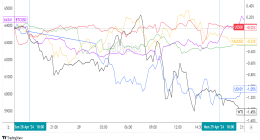
The House passed a resolution Thursday finding Trump adviser Steve Bannon in contempt of Congress and referring to him to the Department of Justice for criminal prosecution over his refusal to cooperate with an investigation into the Jan. 6 attack on the Capitol.
The resolution passed largely along party lines in a 229-202 vote. Nine Republicans voted for the resolution.
“Steve Bannon has led us down this path by refusing to cooperate in any way with our investigation,” Rep. Bennie Thompson, D-Miss., the chairman of the House select committee probing the riot, said on the House floor ahead of the vote. He said the committee needs to talk to Bannon because he has potentially important information about the effort to delay the counting of electoral votes on Jan. 6.
In a Jan. 5 podcast, Bannon said, “All hell is going to break loose tomorrow. … So many people said, ‘Man, if I was in a revolution, I would be in Washington.’ Well, this is your time in history.”
Bannon, a Trump adviser who had been conferring with then-President Donald Trump and his top allies ahead of Jan. 6, snubbed the select committee’s subpoena for testimony and documents about what he knew about the riot, with his lawyer arguing he shouldn’t have to comply because Trump might try to claim executive privilege.
Committee members said he still had an obligation to appear and testify, and hand over relevant documents.
“Mr. Bannon stands alone in his defiance and we will not stand for it,” Thompson said. “We need to make it clear no person is above the law.”
House Minority Leader Kevin McCarthy, R-Calif., had urged his members to vote against the contempt finding, saying the panel had issued “an invalid subpoena” in part because of the lack of Republican representation on the Jan. 6 committee.
House Speaker Nancy Pelosi initially offered McCarthy five spots on the committee, but he pulled all of his picks after Pelosi rejected two of his choices.
The committee still has two Republicans, Reps. Liz Cheney of Wyoming and Adam Kinzinger of Illinois, who are participating without the approval of party leadership.
The criminal referral will be forwarded to the U.S. attorney’s office in Washington, D.C., which will then decide whether to press charges. A conviction could mean up to a year in jail and a fine of up to $100,000. In the past, no criminal charges have ever been filed when an assertion of executive privilege is involved, according to legal scholars.
Attorney General Merrick Garland was asked about the likely referral earlier in the day while testifying before the House Judiciary Committee. Garland said, “The Department of Justice will do what it always does in such circumstances.”
“We’ll apply the facts and the law and make a decision consistent with the principles of prosecution,” he said.
Jacob Fulton contributed.
Source: | This article originally belongs to Nbcnews.com









